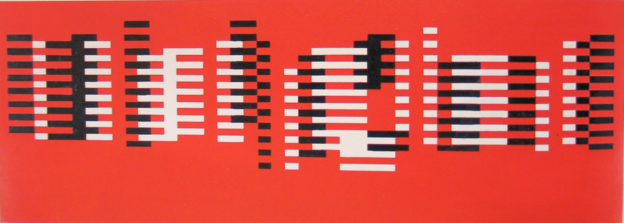'Angels of the Americlypse'
A fugue reading by Rosa Alcalá, Carmen Giménez Smith, Roberto Tejada, and Rodrigo Toscano

On the evening of October 28th, 2015, Rosa Alcalá, Carmen Giménez Smith, Roberto Tejada, and Rodrigo Toscano gave a collaborative performance of their work in the Eck Visitors Center at the University of Notre Dame. The reading was part of a two-day program, “Angels of the Americlypse: readings and colloquia — new Latin@ poetries and literary translation” organized by Letras Latinas, the literary initiative (directed by Francisco Aragón) of Notre Dame’s Institute for Latino Studies, in collaboration with Notre Dame’s Creative Writing Program.
The event was live-streamed online; the video recording is available through YouTube and the audio recording is archived through the University of Notre Dame; an official press release for the event can be read here.
The performance takes the form, as the poets have called it, of a “fugue reading.” Every few minutes a different poet takes to the podium to read, which is familiar enough (for example, two years ago at TCU where I teach, Adam Clay, Ada Limón, and Michael Robins gave a wonderful polyvocal reading in our Live Oak Reading Series with a similar pass-the-mic format): but the analogy of a fugue is more apt than describing the Angels of the Americlypse collaborative reading as either “hierarchical” or “dialogic,” [1] as would be more common.Rodrigo Toscano opens the reading with the line, “The Friday evening gas explosion in Springfield leveled a strip club next to a day care,” and each time he returns to the lectern to read — twelve times in all, including the group’s first and last turns — he repeats this line, subsequently riffing off of it to explore different aspects and potentialities. These poems come from his forthcoming book, Explosion Rocks Springfield (Fence Books, 2016), a collection of eighty poems all expanding from this single line, a line referring to a real event that happened in Springfield, MA on November 23rd, 2012. [2] Considering the group’s performance as a fugue reading, I think Toscano’s line effectively establishes irony as the performance’s home key, if not its subject.
Carmen Giménez Smith, reading her “Ars Poetica” next after Toscano’s opening, develops the irony. Anaphoristic, each line stating an aspect of what her “I” is or is not (“I’m indifferent / I’m a disgrace / I’m funny / I’m assistance / I’m not saved / I was Mormon / I’m atheist // I’m mysterious / I’m scared / I’m head of household / I’m quick tempered / I’m day job / I’m night ghost / I’m a failure / I act white / I live bankrolled / I’m deliverable”), this confession is indignant, cynical, part apology and part F you. And through its anaphora, it reifies in itself a pattern of repetition that supports the fugal concept.
Giménez Smith’s anthology, Angels of the Americlypse: New Latin@ Writing (Counterpath, 2014), co-edited with John Chávez, is the source of this fugue reading’s name.[3] In their introduction, Giménez Smith and Chávez state that with this anthology, “we collectively question the anxious need to patrol the borders of our identities,” intending to “illuminate the blind-spots beyond these false borders,” [4] and to this end, irony serves its purpose. Rosa Alcalá reads her poem “Voice Activation” (starting at 32:12 of the video) in a manner that mimics the halting, flaccid tone of a computer-generated voice, undermining the tacit human perspective in the lines, “luckily I am a native speaker / Luckily I have no accent and you can understand perfectly what I am saying to you via this poem.” Roberto Tejada enters the reading/fugue last, one might say in an episodic role, and his voicing of “Tower, Hiroshima” (55:44), spacing out the lines with punctuating silences, links up to the formal leitmotif of the group performance.
As for final say on why irony, you can judge.
1. Andrea Lunsford and Lisa Ede, Singular Texts/Plural Authors: Perspectives on Collaborative Writing (Carbondale: Southern Illinois University Press, 1990), 67.
2. https://www.bostonglobe.com/metro/2012/11/24/springfield-explosion-injures-least-levels-strip-club/SX7MmBHvdfePUBkpyCgG6L/story.html.
3. Giménez Smith has included Alcalá, Tejada, and Toscano in the anthology.
4. Carmen Giménez Smith and John Chávez, eds., Angels of the Americlypse: An Anthology of New Latin@ Writing (Denver: Counterpath, 2014), xiii.
100 years of hispanglo poetics